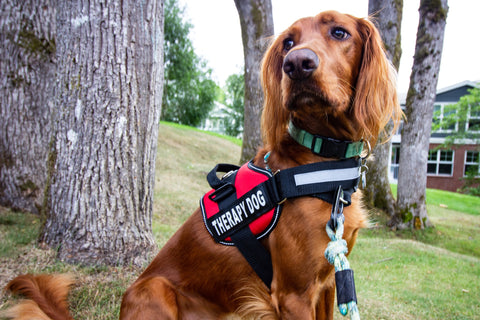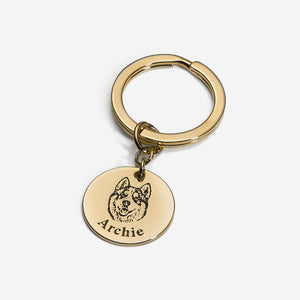No matter who you are- from someone who’s never even seen a service dog to someone who utilizes a service dog in your daily life- there are some things that everyone should know about service dogs. Being aware of these things can help you be a better neighbor to those who need service dogs to help mitigate the impact of a disability on their life.
Maybe you’re just curious about whether having a service dog is right for you. There is a lot of misleading information out there, and even companies that try to sell useless products to those who do not understand what it means to own a dog under the Americans with Disabilities Act (ADA). Understanding exactly what a service dog is for and what your rights are (or aren’t) can help you make the right decision if you’re considering getting a service dog to help you out.
By the way, since this topic is near and dear to my heart, I want to remind you of a very special coupon code we have for you just for deciding to read this week! You can find it about halfway through here :)
What is a service dog?
 According to the ADA, “Service animals are defined as dogs that are individually trained to do work or perform tasks for people with disabilities. Examples of such work or tasks include guiding people who are blind, alerting people who are deaf, pulling a wheelchair, alerting and protecting a person who is having a seizure, reminding a person with mental illness to take prescribed medications, calming a person with Post Traumatic Stress Disorder (PTSD) during an anxiety attack, or performing other duties. Service animals are working animals, not pets. The work or task a dog has been trained to provide must be directly related to the person’s disability. Dogs whose sole function is to provide comfort or emotional support do not qualify as service animals under the ADA.”
According to the ADA, “Service animals are defined as dogs that are individually trained to do work or perform tasks for people with disabilities. Examples of such work or tasks include guiding people who are blind, alerting people who are deaf, pulling a wheelchair, alerting and protecting a person who is having a seizure, reminding a person with mental illness to take prescribed medications, calming a person with Post Traumatic Stress Disorder (PTSD) during an anxiety attack, or performing other duties. Service animals are working animals, not pets. The work or task a dog has been trained to provide must be directly related to the person’s disability. Dogs whose sole function is to provide comfort or emotional support do not qualify as service animals under the ADA.”
There are specific guidelines that the ADA sets for service dogs, their requirements, their rights, and limitations:
- Staff are only allowed to ask 2 questions: Is this dog a service animal that helps with a disability? What tasks is it trained to perform? Besides those 2 questions, they can’t ask for documentation or IDs (we’ll talk about that later), what your disability is, or require your dog to demonstrate its job to them.
- Allergies or fear of dogs doesn’t mean you can exclude a service dog from a location. If this is an issue, accommodations should be made for both the person with the allergy/fear and the person with the service dog, such as putting them farther apart in the room or even in different rooms.
- A service dog can only be required to leave if it is out of control or not housebroken.
- Places that make or sell food are still required to allow service dogs.
- People with service dogs cannot be discriminated against, treated less favorably, or charged a separate fee for having their dog accompany them.
- Places (such as a hotel, business, or rented residence) that charge for damage caused by pets can still charge the owner of a service animal for any damage it causes to the property.
- Others are not required to take care of or watch over a service dog as a part of their accommodation.
Knowing these rights can help you know what is appropriate behaviour regarding service dogs, whether you are working somewhere that must accommodate them, or you are a handler who needs to know your rights.
What Everyone Should Know
Whether you ever intend to utilize a service dog or not, knowing more about them and how you should (or shouldn’t) interact with them can, in the most extreme cases, either endanger or save a life. If you see a service dog in public:
 Please respect them and their owner’s space. Service dogs are not playmates that are just allowed to go anywhere because they are good. People with service dogs are likely just trying to live their normal lives, and it’s not uncommon for them to get a lot of unwanted attention from strangers. Sometimes extra attention from strangers can make it even more uncomfortable or difficult for owners to live their normal lives, especially if their dog helps them with a psychiatric disability such as PTSD. In fact, some dogs are even trained to place themselves in a specific way to create a barrier between strangers and their owners.
Please respect them and their owner’s space. Service dogs are not playmates that are just allowed to go anywhere because they are good. People with service dogs are likely just trying to live their normal lives, and it’s not uncommon for them to get a lot of unwanted attention from strangers. Sometimes extra attention from strangers can make it even more uncomfortable or difficult for owners to live their normal lives, especially if their dog helps them with a psychiatric disability such as PTSD. In fact, some dogs are even trained to place themselves in a specific way to create a barrier between strangers and their owners.
It is dangerous to distract a service dog. Even if you don’t think that the dog is working, distracting it may cause it to miss something important when it comes to the health of their owner. For example, some service dogs serve to alert their owners to oncoming seizures and safely help them through it. In this case, if the dog is distracted, it might not be able to detect an oncoming seizure and perform its job to keep its owner safe. You may also notice a dog doing something you may consider unusual, but it may be performing part of its work, such as dogs that are meant to detect allergens that may be dangerous or deadly to their owners.
If a service dog approaches you without an owner, it may need help. The only time you should really follow a service dog is if it comes up to you without its owner or is obviously trying to get your attention. A dog can be trained to seek out emergency help if their owner has a seizure or is otherwise incapacitated, and getting another human to help can save someone’s life!
Some disabilities are invisible. Service dogs are being trained to help with more and more disabilities. Just because you see someone who doesn’t look disabled with a service dog, doesn’t mean that they are “faking it”. In general it’s best to live and let live, give others the benefit of the doubt, and respect others regardless of whether you know what they’re going through or not. Of course, this is a good rule in general when it comes to life!
Here we go! I’m so grateful that you read this far, I wanted to remind you of our very special coupon code “weluvyou”. Not only does it get you 10% off your purchase, but 50% of the proceeds will go to a few pet charities you can read about here. One of the charities we chose specifically helps train service dogs for veterans, so check it out when you’re done reading!
If You Want A Service Dog
 Do you want a Service Dog, or an Emotional Support Animal? If you want your dog to be a service dog just because they “make you feel better”, that actually falls under a different name. The ADA actually has a separate category for an animal that is not trained to mitigate a disability, but still fills an important emotional need. If you’d like a special note for your dog due to this reason, you can ask your doctor for a note for your dog to be an “emotional support animal”. An emotional support animal, or ESA, doesn’t get all the privileges of a Service Dog, but it can help you with things such as being accommodated in housing that normally does not permit pets. An ESA is also allowed to accompany you on a flight, as long as it is not dangerous or disruptive during the trip.
Do you want a Service Dog, or an Emotional Support Animal? If you want your dog to be a service dog just because they “make you feel better”, that actually falls under a different name. The ADA actually has a separate category for an animal that is not trained to mitigate a disability, but still fills an important emotional need. If you’d like a special note for your dog due to this reason, you can ask your doctor for a note for your dog to be an “emotional support animal”. An emotional support animal, or ESA, doesn’t get all the privileges of a Service Dog, but it can help you with things such as being accommodated in housing that normally does not permit pets. An ESA is also allowed to accompany you on a flight, as long as it is not dangerous or disruptive during the trip.
What NOT to do
A service dog is not just a buddy or a pet. If your dog makes you happier when they’re around, great! However, this alone isn’t enough to bring your dog to the grocery store or a restaurant. Service dogs are trained to perform specific tasks to minimize the impact of a disability, not to be companions.
There is no certificate you can buy to make your dog “official”. It is illegal for any business to require documentation to “prove” your service dog is real. There are fake services and websites that claim to sell a registration or certificate to make your dog a service dog and just give you all the rights a service dog would have by paying them. Whether you want this certificate because you truly have a service dog, or you just think it’s a way to bring your dog wherever you want, showing off some sort of paper proclaiming your dog’s legitimacy can be harmful. If a dog is brought into an establishment where it’s not normally allowed because of this “certificate”, the people that work there may believe that official papers are required for all real service dogs. This can lead to them stopping people with disabilities from bringing their service dogs with them because they misunderstand the law. Even worse, if an untrained dog gets into an establishment because their owner showed a fake certificate, and that dog causes trouble, the business may refuse to allow any service dogs due to damage or injury caused by an untrained dog.
 Treating your dog as if it is a service dog without the proper training can be harmful to others. Even if your dog is well behaved in general, if it causes the slightest distraction to a working service dog, it can cause a bad situation. A poorly trained dog can create bad expectations or stereotypes and make it more difficult for others with properly trained service dogs to access the everyday places and services that we often take for granted.
Treating your dog as if it is a service dog without the proper training can be harmful to others. Even if your dog is well behaved in general, if it causes the slightest distraction to a working service dog, it can cause a bad situation. A poorly trained dog can create bad expectations or stereotypes and make it more difficult for others with properly trained service dogs to access the everyday places and services that we often take for granted.
What you SHOULD do:
Talk to your doctor or mental health professional about getting a service dog. Your healthcare professional can provide a written note to your landlord or anyone else that requires it regarding your need for a service dog. They can also help you decide whether a service dog can truly help you, or if it would be the best way to mitigate your health issue or disability.
Seek out professional trainers when you can. Getting help from a knowledgeable trainer, or even better, an organization that regularly trains service dogs, can help you be prepared and confident in your dog’s ability to help. Even though you could technically train your service dog on your own, it can be very stressful, and may take longer to successfully teach it to perform its tasks. Especially tricky tasks, such as detecting seizures, will probably need to be taught by a professional. A trainer can also help you keep your dog sharp and in top shape so any skills it does not use as often don’t fade over time. They may even be able to teach your dog tasks you didn’t even think of, such as turning on lights in the middle of the night if you suffer from nightmares due to PTSD.
Know what your rights are (or aren’t). I outlined the general rules you’ll need to know above, but having a deeper understanding of the ADA will help you assess situations you may find yourself in, especially if you encounter an establishment that isn’t familiar with service dogs. They also have a toll free hotline you can call for more information.
Finally, be aware that a service dog will bring a lot of unwanted attention your way. Unfortunately, people are generally unaware of what they should do when it comes to proper and respectful behaviour as it comes to service dogs and handlers. Some people will stop you and distract your dog. Some people may get frustrated or judge you based on how much of your disability they can “see”. Sometimes all of this can make your disability even more difficult to cope with.Unfortunately, benefitting from a service dog may also mean that you experience more nosy or disruptive people than usual.
What do you think?
Did you learn something new? Are you considering getting your own service dog? Or maybe you have a service dog and would like to share some information or insight I may have missed. We’re always happy to hear from you, so let us know what you think! I’d like to personally thank you for reading and learning more about service dogs. Together we can make this world a better place for everyone!







